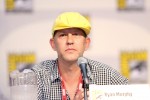Ryan Murphy is quick to point out that his career doesn’t make sense on paper.
His career as a writer, director, producer and show creator spans multiple genres – he followed his musical comedy “Glee” with the much darker “American Horror Story.”
On Thursday, he’ll use his wide-ranging experience to offer students insight into the television industry as a guest lecturer for the “Overview of Network Television Management” class at the James Bridges Theater, which is open to the public.
The Daily Bruin’s Olivia Mazzucato spoke with Murphy about why he chose to speak to the UCLA class, the ways in which his career has changed over the years and advice he has for aspiring filmmakers.
Daily Bruin: Why did you want to come speak to this class of young filmmakers?
Ryan Murphy: I always think selfishly about when I was that age, what I had wished people had talked to me about in the business and what to do and what not to do and lessons learned along the way.
I went to Indiana University, and I didn’t really grow up with that kind of access to people in the business, and it would have been very helpful to me even to hear what not to do or what to lean in to do. And so I always like talking to young people; I always find it very interesting.
DB: What kind of insights do you plan on offering?
RM: I never really plan on any insights. I just like it when people ask me questions and I honestly try and answer them. There’s nothing I won’t answer. People are always so interested in the process of what I do, but it’s not until I’m asked, “What time do you start your day?” or “What’s the biggest lesson you’ve learned?” or “What are you trying to deal with now?” that you can figure anything out.
DB: You’ve had a diverse career. How have you avoided being pigeon-holed or limited to any particular genre?
RM: I always try and make it a point of doing the opposite of what I just did. So what I did in “Glee,” for example, which was a musical, the next thing I did was “American Horror Story.” … I followed that up with a serious drama, “The Normal Heart.” And then I did something really pop culture, like “The People v. OJ Simpson.” … I just am drawn to tackle things where I can learn something new.
DB: In your eyes, how has the television landscape changed in the past few years?
RM: I feel like the world has exploded in terms of how you can watch shows and where you can do them, and there’s no rules anymore, which is very exciting.
When I was starting out … you kind of had to do everything note by note based on what the business paradigm was if you wanted to have success. Now you don’t. You can create and be rewarded for your own agendas and your own structures. … There’s just no end in sight. I feel like television is the wave of the future, the art form of the future.
DB: How has your approach to tackling a specific project evolved over the years?
RM: When I started my career, I was much more of a lone wolf. I was much more interested in my singular point of view. … But I think the older I get, the more I’m really interested in working in a large collaboration with a group of people. All of the stuff I’ve done recently has been that and it’s been very rewarding. But I think that’s just maturing of the human being. The more successful you become, the more secure you are about having other strong opinions around you.
DB: What advice do you have for any aspiring UCLA filmmakers who hope to have the kind of career that you spent your life building?
RM: You just have to be bold, and I think you have to not be afraid of the word no. … As painful as the no’s are, I believe that if you want something badly enough, the universe will conspire to give it to you. So you have to just keep trying and never give up. And I never gave up.
I started off in the business with seven friends of mine, all of whom were more talented than me, I think, and the only difference between me and them is they gave up. They took the rejections personally and I never did. … If you have a belief, know that somebody one day is going to share it and going to celebrate it.

Why not state the actual date? I missed the engagement because the date wasn’t given, just “Thursday”.